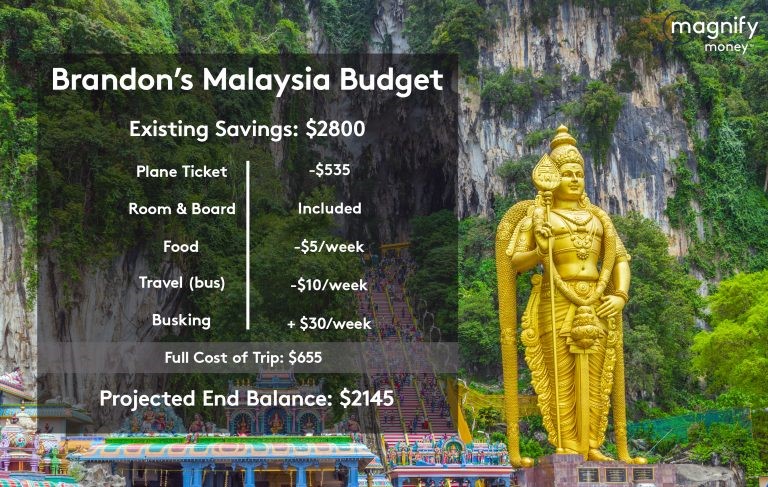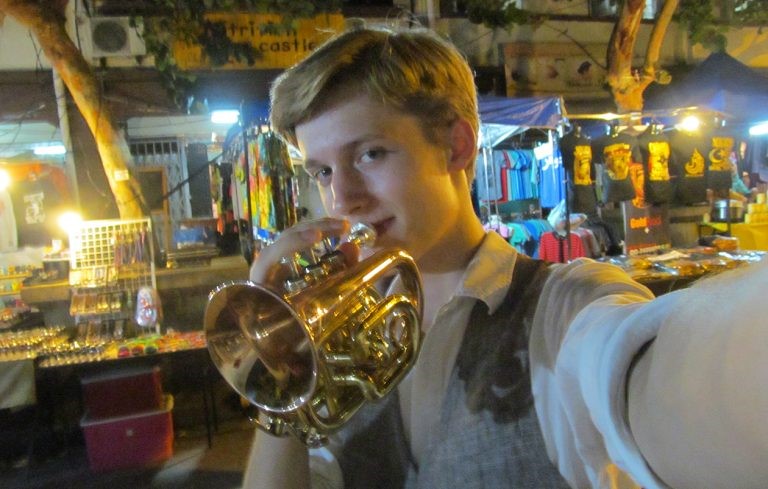Brandon Stubbs isn’t your typical 18-year-old high school graduate. In addition to graduating valedictorian from his Grass Valley, Calif., high school, he’s joined the ranks of a growing number of students embracing the concept of taking a gap year before starting college.
While other college freshmen began their first classes this fall, Stubbs, who plans on attending Brown University, kicked off his gap year with a trip to Malaysia.
A gap year is usually more than just a nice break from calculus exams and book reports. Many students choose to focus on personal growth and incorporate travel abroad or participation in volunteer projects. That growth can come at a high cost. Some programs, like the $35,000 Global Gap Year offered by Thinking Beyond Borders, can cost more than what some students pay for a four-year college degree.
But, there are plenty of ways to trim costs and still have a great gap year. We reported on some here, which is how we met Stubbs.
We asked Stubbs to share his budget so far. Take a look at how he’s financing the first leg of his gap year in Malaysia:

We caught up with Stubbs to see how his budget is holding up in Malaysia and how he intends to spend the rest of his gap year. Here’s what he said.
MagnifyMoney: Where are you now?
Brandon Stubbs: I’m taking two months of my gap year in Malaysia, one of the most diverse countries in the world. Right now I’m in Johor Bahru, the southernmost city of Malaysia, just across the bridge from Singapore.
MM: What drove your decision to take a gap year?
BS: After my high school graduation, I was definitely, to an extent, burnt out and, while I was excited to attend Brown University, I wasn’t as ready or enthusiastic to start college this fall as I will be next fall. This gap year has provided me the opportunity to gain experience in the real world while simultaneously recharging my mental battery. I’m learning a lot in an entirely different way than in the classroom. And my enthusiasm and excitement for next fall has only increased as I’ve grown as an individual throughout this gap year.
MM: Why Malaysia?
BS: As a student going into archaeology, it’s really important for me to be getting this exposure to this blend of Eastern cultures as well as to the geography and climate. Tropical rainforests thrive here, so I’ve been able to go on some real Indiana Jones-esque expeditions into the jungle. I’ve also visited some incredible Buddhist and Hindu temples throughout the country that have proven to be very enlightening experiences.
MM: How did you you save up for this trip?
BS: I had $2,800 saved up for this trip, which I earned working as a tutor throughout high school and as a music camp counselor during the summer. I paid for my flight through StudentUniverse [a site that offers affordable fares to students]. I booked a flight on Air China for $535.
MM: How do you stay on budget?
BS: My room and board is covered in exchange for my volunteer service [at the hostel where I am staying] so I only have to spend money on food and transportation. Often, I’ll only spend money on brunch and dinner during a day, but I’ll spend a little more for excursions into Malaysia or Singapore.
MM: What are you doing for money out there?
BS: I’ve done some street performing in the past on my trumpet at the local “Cornish Christmas” celebrations and other outdoor festivities. On top of that, I am focusing on the style of New Orleans Dixieland jazz, which lends itself quite well to solo street performance. I intended to bring my trumpet, anyway, if just to practice, so the idea of playing it in public was natural. So far I’m earning about 160 [Malaysian ringgit] a week, which translates to $40, for playing five nights a week. But the money is enough to cover most of my daily expenses in Malaysia.
MM: What’s your typical day like?
BS: I have two days a week off from my work at the hostel. On those days, I’ll either go into Singapore and visit some of the attractions and districts of that amazing city or explore the nature and culture of Malaysia, hiking or visiting new towns. On my work days, I’ll spend a few hours cleaning and checking guests in and out and on my downtime work on my second book or street perform on my trumpet.
MM: Did your parents help you with any expenses?
BS: My parents did help pay for some of the preparatory expenses, like my typhoid shot or general supplies – flashlight, mosquito repellent, etc. Aside from that, I am covering all of my own expenses.
MM: When do you get back?
BS: I’ll return to the States toward the end of November.
MM: Will you have any funds left when you return?
BS: I expect to return with $1,800 or $1,900 remaining. I shouldn’t spend more than $1,000 on the entire two-month trip, all expenses included.
MM: What will you do for the remainder of the gap year?
BS: Once I return to the U.S. I intend to spend several months publishing and advertising my first book, “The King of Kamaahr.” My plans for the spring are still not set in stone, but right now I think I’ll go to Sydney, where I have some family and Australian citizenship, and spend a few months living there. I’ll try to find work there as a musician and/or an actor as well as advertise my book outside the U.S.


